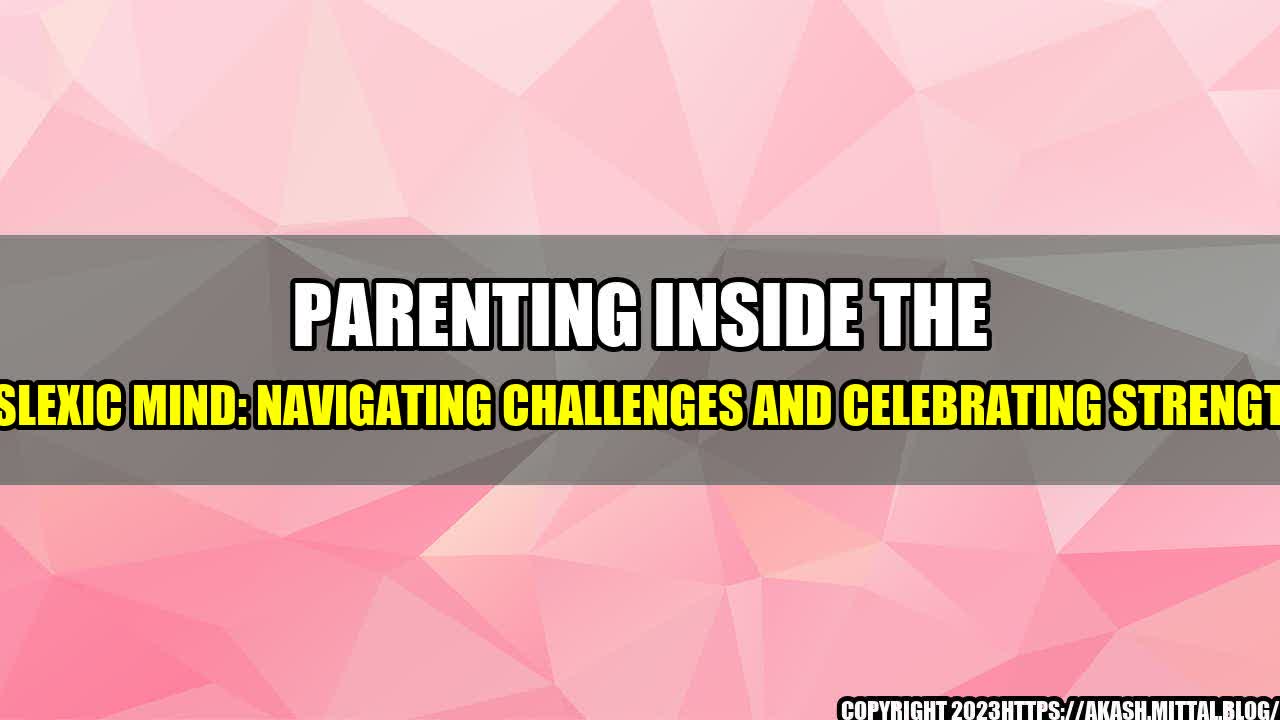
As a parent, you want nothing but the best for your child. You want them to succeed in school, form meaningful relationships, and fulfill their dreams. But what happens when your child faces a learning difference like dyslexia?
Dyslexia, a neurological condition that affects reading and related language-based processing skills, can pose unique challenges and opportunities for children and their families. In this article, we'll delve into the dyslexic mind and explore ways to support and empower children with dyslexia.
A Dyslexic Journey
Let's step into the shoes of a young girl, let's call her Rachel. Rachel is an energetic and curious nine-year-old, with a love for sports and animals. Her family has noticed that she struggles with reading and writing, and often gets frustrated and overwhelmed with schoolwork. They've tried various tutoring programs and accommodations, but Rachel's progress seems slow and inconsistent. Rachel's parents feel increasingly worried about her self-esteem and future prospects.
Rachel's story highlights some common challenges that dyslexic individuals and their families face. Dyslexia can be enigmatic, with symptoms that can vary widely from person to person. Some dyslexic individuals may struggle with phonemic awareness (the ability to match sounds to letters), while others may have difficulty with sight words (the high-frequency words that are memorized by sight). Some may struggle with spelling, while others may have trouble with oral language skills, such as expressing themselves coherently or understanding abstract concepts.
In addition to these academic challenges, dyslexic individuals may face socio-emotional issues, such as anxiety, shame, or depression. Dyslexia can impact one's sense of self-worth, as well as social relationships, since dyslexic individuals may feel isolated or misunderstood. Dyslexia can also impact one's broader life goals, since it can create obstacles to pursuing certain careers or hobbies.
Quantifiable Examples
Despite these challenges, dyslexic individuals are not doomed to a life of struggle or failure. In fact, many dyslexic individuals have achieved remarkable success in a wide range of fields. Consider some of the following examples:
- Richard Branson: The billionaire founder of Virgin Group struggled with dyslexia as a child, but found creative ways to cope with his learning differences. He excelled at entrepreneurship and is now one of the most influential business leaders in the world.
- Steven Spielberg: The acclaimed filmmaker struggled with dyslexia and undiagnosed ADHD throughout his school years. He found solace in his passion for storytelling, and went on to direct some of the most beloved films in history.
- Tim Tebow: The former NFL quarterback was diagnosed with dyslexia at a young age, but also showed early signs of athletic prowess. He used his determination and faith to lead his team to numerous victories and inspire fans around the world.
These examples show that dyslexia does not define one's potential or destiny. Dyslexic individuals possess unique strengths, such as creativity, resilience, and empathy, that can serve them well in many areas of life.
Navigating Dyslexia as a Parent
As a parent of a dyslexic child, it can be overwhelming to navigate the complex landscape of schools, accommodations, and emotional support. However, there are several key strategies that can help you and your child thrive:
1. Educate yourself and others: Learn as much as you can about dyslexia, including its symptoms, causes, and implications. Talk to your child's teacher, school psychologist, and other professionals to advocate for your child's needs. Encourage others in your family and community to learn about dyslexia, and dispel any myths or stereotypes that exist.
2. Build a positive home environment: Create a nurturing and supportive home environment that values your child's unique skills and interests. Encourage open communication, active listening, and problem-solving. Keep a growth mindset, where mistakes are seen as opportunities to learn and grow. Celebrate your child's progress and achievements, no matter how small.
3. Connect with resources and community: Reach out to dyslexia-focused organizations, such as the International Dyslexia Association or Dyslexia International, to access resources, events, and advocacy tools. Connect with other parents and families who are also navigating dyslexia, through support groups or online forums. Seek out dyslexia-friendly schools or tutors who specialize in evidence-based interventions, such as Orton-Gillingham or multisensory approaches.
By taking these proactive steps, parents can help their dyslexic children navigate the challenges of dyslexia and thrive in their unique strengths. Dyslexia may present obstacles, but it can also offer opportunities for resilience, creativity, and self-discovery.
Reference URLs:
International Dyslexia Association: https://dyslexiaida.org/
Dyslexia International: https://www.dyslexia-international.org/
Orton-Gillingham Approach: https://www.ortonacademy.org/
Multisensory Approach: https://ldaamerica.org/types-of-instructional-methods/
Hashtags:
#DyslexiaAwareness #DyslexiaSupport #ParentingTips #LearningDifference #StrengthsBased #SpecialEducation #EducationAdvocacy
Curated by Team Akash.Mittal.Blog
Share on Twitter Share on LinkedIn